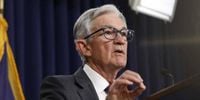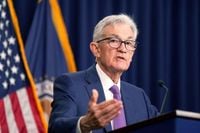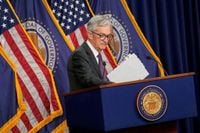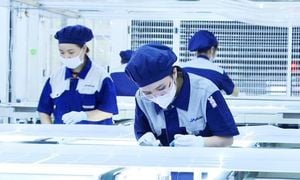On April 16, 2025, stock markets continued their downward trajectory as Federal Reserve Chair Jerome Powell expressed concerns that the economy is "moving away" from the central bank's dual goals of maximum employment and stable prices. During a speech at the Economic Club of Chicago, Powell highlighted the challenges posed by recent tariff policies and their potential impact on inflation and economic growth.
Powell's remarks came amid heightened uncertainty in the economic landscape, which has prompted investors to reassess their expectations. The S&P 500 index fell by 2.2%, and the Nasdaq experienced a more significant decline of 3.2%, reflecting the market's reaction to Powell's comments and the broader economic outlook.
In his speech, Powell noted that despite the current challenges, the U.S. economy remains in a solid position, with the labor market nearing maximum employment levels. He pointed out that inflation, while having decreased significantly from its pandemic highs, is still running slightly above the Federal Reserve's 2% target. "The level of the tariff increases announced so far is significantly larger than anticipated," Powell stated, indicating that these tariffs could contribute to a toxic mix of higher inflation and slower growth, a scenario commonly referred to as stagflation.
Powell emphasized the Fed's commitment to its dual mandate, which is to promote maximum employment while ensuring price stability. He acknowledged that the current economic environment presents a "challenging scenario" for policymakers, as they navigate the complexities of trade policy and its implications for inflation.
Recent economic data suggests that growth has slowed in the first quarter of 2025 compared to the previous year. Powell mentioned that nonfarm payrolls have increased by an average of 150,000 jobs per month during the first three months of the year, but this growth is less robust than in previous periods. The unemployment rate remains low and stable, largely due to a combination of low layoffs and a slower increase in the labor force.
As for inflation, Powell noted that while total personal consumption expenditures (PCE) prices rose by 2.3% over the 12 months ending in March, core PCE prices, which exclude volatile food and energy categories, increased by 2.6%. These figures indicate that while progress has been made in reducing inflation, the Fed still faces significant challenges in achieving its long-term price stability goals.
In light of these developments, Powell reassured the audience that the Federal Reserve is well-positioned to wait for greater clarity on policy directions before making any significant changes to interest rates. He stated, "Our obligation is to keep longer-term inflation expectations well-anchored and to make certain that a one-time increase in the price level does not become an ongoing inflation problem." This statement reflects the Fed's cautious approach in the face of potential tariff-driven price hikes.
Moreover, Powell underscored the importance of maintaining the Fed's independence from political pressures, asserting, "Our independence is a matter of law." This statement comes amid ongoing discussions about the implications of the Trump administration's tariff policies, which have introduced a level of volatility and uncertainty into the markets.
As the Federal Reserve continues to monitor incoming economic data, traders have adjusted their expectations regarding future interest rate cuts. As of April 16, traders were pricing in only a 14.2% chance that the Fed would cut interest rates at its upcoming May meeting, a decrease from 20.4% the previous week. This shift reflects growing concerns about the impact of tariffs and the overall economic outlook.
In summary, Powell's speech at the Economic Club of Chicago highlighted the complexities facing the Federal Reserve as it strives to balance its dual mandate amid evolving economic conditions. With inflation still above target and growth showing signs of slowing, the central bank will need to tread carefully in the coming months.
As the situation unfolds, both investors and policymakers will be watching closely to gauge how the interplay between tariffs, inflation, and employment will shape the economic landscape in the near future.






